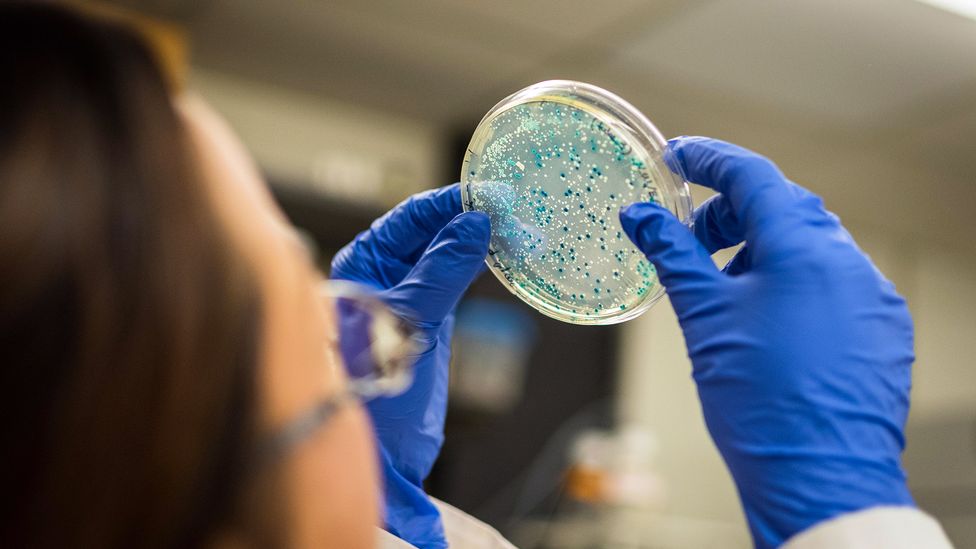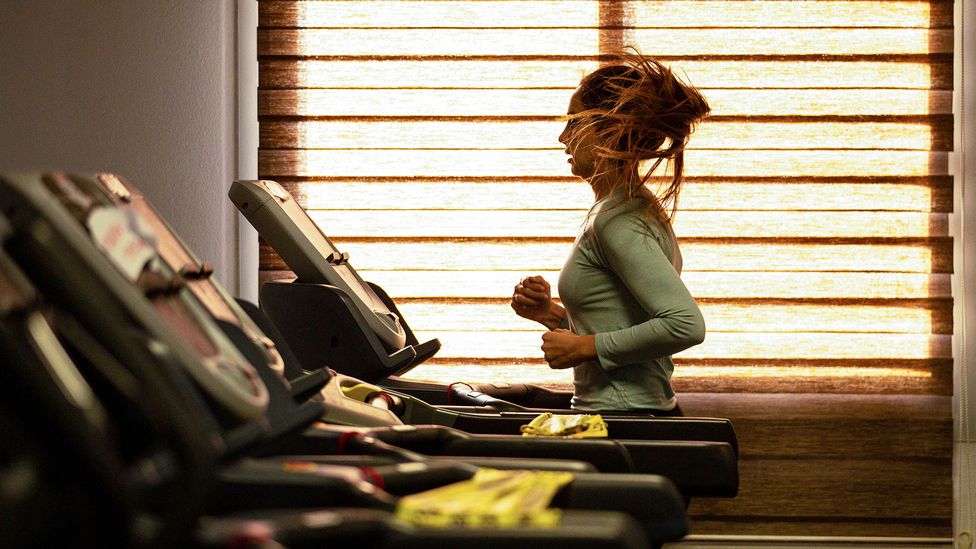The rich microbiota flourishing inside us may play a far greater role in the way exercise improves our health than previously thought.
Our guts are bustling with life. Jostling for space and food inside our gastrointestinal tract are about 100 trillion bacteria, viruses, fungi, and other single-celled organisms such as archaea and protozoa. Their roles vary from helping to ferment dietary fibre from our meals, to synthesising vitamins and regulating our fat metabolism. They also help to protect us from unwanted invaders, interacting with our immune system and influencing the extent of inflammation in our guts and elsewhere in our bodies.
A lower diversity of these gut residents has been seen in patients suffering from obesity, cardiometabolic diseases as well as autoimmune conditions. Certain diseases have been associated with too many or too few of particular species of bacteria in our gut. Lower than normal levels of one of the most abundant bacteria in the guts of healthy adults, a rod-shaped bacterium called Faecalibacterium prausnitzii, has been associated with inflammatory diseases.
Numerous factors – including our genes, the types of medication we take, the stress we are under, if we smoke and what we eat – can all interplay to alter the balance of microorganisms in our gut. The make-up of this internal community is, in fact, highly dynamic.
But just as simple lifestyle choices can alter our gut microbes, so can we make choices that will help them flourish in a healthier way. Eating a diverse diet consisting of more than 30 different plant foods per week can help. A good night’s sleep and lower levels of stress can also be beneficial. Surprisingly, spending time in nature might also have a positive effect.
It is perhaps more surprising still, however, that exercise can also influence our gut bacteria. While we all know how beneficial exercise is for our physical and mental health, could a post-work jog also be just what we need to keep our gut microbes in shape too?
"Exercise seems to be affecting our gut microbes, by increasing bacterial communities that produce short chain fatty acids (SCFAs)", says Jeffrey Woods, a professor of kinesiology and community health at the University of Illinois at Urbana-Champaign and who studies the effects of exercise on the human body.
"Short chain fatty acids are a type of fatty acids that are primarily produced by microbes and have been shown to modify our metabolism, immunity and other physiological processes," adds Jacob Allen, an assistant professor of exercise physiology at the University of Illionis who works alongside Woods.
The balance of bacteria living in our gut can have significant impact on our health through inflammation, bowel disease and our immune system (Credit: Manjurul Haque/Alamy)
Over the past 10 years, research looking at both animals and humans has helped reveal just how powerful this link between exercise and changes in the gut microbial community is. More importantly, it has shed light on how it might actually benefit us.
Some of the first clues can be found in studies of animals. Mice, for example, that were allowed to voluntarily run on a wheel when they wanted were found to have significantly lower numbers of a particular bacteria called Turicibacter. The presence of these bacteria is associated with an increased risk of bowel disease, say Woods and Allen, who led the study. Mice that were sedentary or given some gentle prodding to encourage them to run had far higher numbers of these bacteria. (It is thought that forcing the mice to run caused the animals chronic stress that may counteract the benefits of the exercise.)
The gut microbes in rats also seem to benefit from voluntary running on a wheel. Researchers have found that the exercise also seems to lead to higher levels of a particular short-chain fatty acid called butyrate, which is produced by bacteria in the gut through the fermentation of fibre and has been linked to numerous health benefits. Butyrate itself plays a number of roles in the body – it is the primary fuel for our gut cells, helps to control the gut barrier function and regulates inflammation and the immune cells within our gut.
The gut microbe Faecalibacterium prausnitzii is considered to be one of the main bacteria responsible for the production of butyrate. Butyrate-producing bacteria have been associated with beneficial effects on metabolism in both mice and humans. In particular, the reduction in numbers of Faecalibacterium Prausnitzii has been linked to inflammatory bowel diseases, its presence being needed for anti-inflammatory actions. A number of recent animal studies have indicated that exercise can increase the abundance of this bacteria in the guts of mice.
In 2018, researchers in the US also found that if they transplanted the gut microbes from exercise-trained mice to germ-free mice, it could reduce the amount of inflammation in the guts of those mice that received the microbes.
Athletes also tend to have increased gut microbial diversity compared to sedentary people
But while these studies in animals provide some clues as to how exercise can alter the balance of gut microbes for the better, we are not mice. So what do human studies tell us?
There is certainly no shortage of studies in humans that show doing moderate to vigorous exercise such as running, cycling and resistance training may potentially increase the diversity of bacteria in the guts. This has been linked to better physical and mental health. Doing aerobic exercises for as little as 18-32 minutes, coupled with resistance training three times a week, for a total of eight weeks could make a difference.
Athletes also tend to have increased gut microbial diversity compared to sedentary people, although some of this could be due to the specialised diets that competitors often have too. But a number of studies have shown that the combination of exercise and diet can boost Faecalibacterium prausnitzii numbers and the production of butyrate in active women, often with improved gut function.
"Some, but not all, studies have shown exercise to increase Faecalibacterium," says Woods. People with low levels of this type of bacteria appear to be more at risk of suffering inflammatory bowel disease, obesity and depression, he adds.
Studies by Woods and Allen have have highlighted that going for a 30-60 minute run or bout on the treadmill at the gym can have an impact on the abundance of butyrate-producing bacteria such as Faecalibacterium in the gut. In one study involving 20 women and 12 men with various body mass indexes (BMI), Woods and his colleagues set out to determine whether doing aerobic exercise for six weeks can change the gut microbes in previously sedentary human adults. They asked the participants to do three moderate-to-vigorous intensity aerobic exercise sessions a week, either by running on a treadmill or cycling for 30-60 minutes. Stool and blood samples were collected throughout the study, with three-day dietary controls to ensure their diet remained consistent before each collection to limit the changes caused by diet on gut microbes.
Running on a treadmill for 30-60 minutes, three times a week, was found to boost butyrate-producing bacteria in the gut (Credit: Hussein Faleh/AFP/Getty Images)
Their findings showed that "butyrate producers" increased in abundance with exercise training irrespective of body mass index. Accompanying the change in the microbe community, the lean participants showed an increase in short-chain fatty acids such as butyrate in their stool samples. Interestingly, when those taking part in the study returned to their sedentary lifestyle over the following six weeks, the researchers found the participant's gut microbes returned to their initial state. It suggests that while exercise can improve the health of the microbial community in our guts, these changes are both transient and reversible.
You might also like:
- How your microbiome can improve your health
- What we do and don't know about gut health
- The link between gut health and weight
Another small study, published in 2019 by a team led by Jarna Hannukainen an adjunct professor in the department of clinical medicine at the University of Turku in Finland, noticed more specific changes to the microorganisms in the guts of 18 sedentary participants who had been either diagnosed with type 2 diabetes or prediabetes. The participants either did high-intensity interval training (bursts of 30 seconds of cycling with four minute recovery between four, then five and then six bouts) or moderate continuous training (40-60 minutes of cycling), three times per week over a two-week period. The researchers noticed that both training modes increased Bacteroidetes bacteria. Bacteroidetes are a critical group of gut bacteria that play a role in breaking down sugars and proteins, and induce the immune system into producing anti-inflammatory molecules inside the gut. Reduced levels of these bacteria have been associated with obesity, and irritable bowel syndrome.
The training also decreased levels of Clostridium and Blautia bacteria, which are thought to aggravate parts of the immune system at high levels and so increase inflammation. Indeed, Hannukainen and her team saw significantly lower levels of molecules that indicate inflammation in the blood and intestines in participants that had been exercising. In particular there were lower levels of inflammatory markers known to bind to lipopolysaccharides – components found in the cell walls of gut bacteria. These are known to cause low-grade inflammation around the body, as well as playing a role in insulin resistance and the development of atherosclerosis, which in turn increases the risk of heart attacks and strokes.
Hannukainen and her colleagues say their work has also shown that exercise specifically reduced gut bacteria that have been associated with obesity.
The exact mechanisms for how exercise affects the microorganisms living in our guts is still to be fully understood (Credit: Maridav/Alamy)
But it is still not clear exactly how exercise leads to changes in the community of microorganisms living in our guts, although there are several theories, says Woods.
"Lactate is produced when we exercise, and this could be serving as fuel for certain bacterial species," he says. Another potential mechanism, he explains, could be through exercise-induced alterations in the immune system, especially the gut immune system, as our gut microbes are in direct contact with the gut's immune cells.
Exercising also causes changes in blood flow to the gut, which could affect the cells lining the gut wall and in turn lead to microbial changes. Hormonal changes caused by exercise could also cause changes in gut bacteria. But none of these potential mechanisms "have been definitively tested", says Woods.
Some elite athletes often suffer from exercise-induced stress due to the high-intensity training they do. As many as 20-60% of athletes suffer from stress due to overtraining and inadequate recovery, according to some estimates. But the bacteria in our guts could help control the release of hormones triggered by exercise-related stress, while also potentially helping to release molecules that improve mood. They can also help athletes with some of the gut problems they experience. Further research is however needed in this field.
But there is still much more we can learn about how our physical activity affects the creatures living inside our guts, such as how different types of exercise and its duration might alter the microbial community. It may also differ from individual to individual, based on their existing gut residents as well as BMI and other lifestyle factors, such as their diet, stress levels and sleep.
As scientists continue to tease out more of the secrets hidden within our gastrointestinal tracts, we may find new ways to improve our health through the bustling and diverse communities of organisms that call us their home.
Latest Stories
-
Baltasar Coin becomes first Ghanaian meme coin to hit DEX Screener at $100K market cap
38 minutes -
EC blames re-collation of disputed results on widespread lawlessness by party supporters
52 minutes -
Top 20 Ghanaian songs released in 2024
1 hour -
Beating Messi’s Inter Miami to MLS Cup feels amazing – Joseph Paintsil
1 hour -
NDC administration will reverse all ‘last-minute’ gov’t employee promotions – Asiedu Nketiah
2 hours -
Kudus sights ‘authority and kingship’ for elephant stool celebration
2 hours -
We’ll embrace cutting-edge technologies to address emerging healthcare needs – Prof. Antwi-Kusi
2 hours -
Nana Aba Anamoah, Cwesi Oteng special guests for Philip Nai and Friends’ charity event
2 hours -
Environmental protection officers receive training on how to tackle climate change
2 hours -
CLOGSAG vows to resist partisan appointments in Civil, Local Government Service
4 hours -
Peasant Farmers Association welcomes Mahama’s move to rename Agric Ministry
4 hours -
NDC grateful to chiefs, people of Bono Region -Asiedu Nketia
4 hours -
Ban on smoking in public: FDA engages food service establishments on compliance
4 hours -
Mahama’s administration to consider opening Ghana’s Mission in Budapest
4 hours -
GEPA commits to building robust systems that empower MSMEs
4 hours

